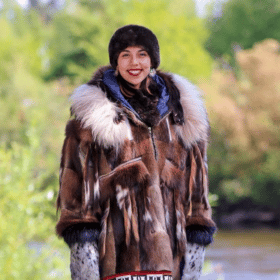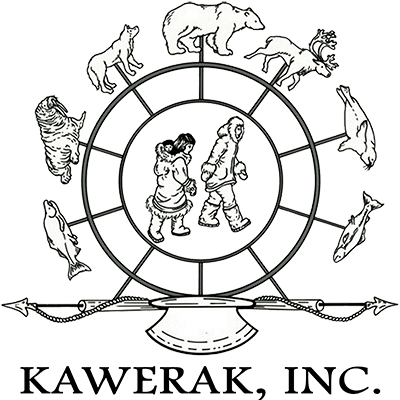Can you share a fun fact about yourself?
I am honored and humbled to currently hold the title for 2018 Miss WEIO (World Eskimo Indigenous Olympics). My platform is that we are stronger together: celebrating and learning from one another. I believe it is important to create space and dialogue to explore our shared cultures, histories, and identities to heal and strengthen our communities.
What drew you to the Caleb Scholars Program? Do you have a personal story about meeting Caleb, connection to his story, or family connection?
Unfortunately, I had never had the chance to meet Caleb. I did, however, hear recordings and read transcripts of his speeches while I interned in the Eskimo Heritage Program Archive. I was inspired by his humble demeanor and deep love for his traditional lifestyle and wanting his community to practice it for generations to come. My aana (grandmother) Myrtle is first cousins to Caleb’s wife, Gladys, and I was happy to meet her at my first Caleb Scholars Gathering as a Scholar in my undergrad.
What does marine conservation mean to you? How do you engage with marine conservation at school and/or at home?
I first believed marine conservation to be inherent to traditional, subsistence living and intrinsically tied to all Native Alaskan values and practices. Through further introspection, marine conservation has begun to take on a new form of indigenous resilience and a means of decolonization. At home, I am humbled to practice subsistence hunting, fishing and gathering. At school, I am learning of the ways communities can organize and return governing power over our lives, environments, and resources.
What are your future educational and career goals? What are the top three things that are moving you toward those goals?
I am currently working towards a Masters in Indigenous Politics. The program has the option for a PhD tract and I will see how the next year goes to decide if that it in my future. I am passionate about cultural preservation and perpetuation, so I would love to work in any field within that. It is so diverse that I could see myself in funding (grant writing / evaluating), land-based education, or administration (capacity building / community organizing). My top three motivators are within my family: 1. My elders (and ancestors) who have passed on traditions of resilience, 2: my younger siblings and cousins who are always watching and learning from our collective actions, and 3: my future family, whether my own children, grandchildren or cousins, nieces, nephews to come.
Can you share a memorable story from your past when you felt a relationship to the ocean or waterways?
This summer is the first time my partner and I took on the responsibility of gathering and processing salmon from river to smokehouse / pressure cooker / freezer. This included seining with a boat one day, and setting and continuously checking a gill net in the river for a week. Of course, it would not have been possible without my parents for resources, guidance, and assistance. The entire process of filleting, hanging, brining, drying, smoking, jarring, and packaging fish gave me a deeper appreciation for the beautiful waterways and tundra we are able to harvest from. I not only learned the skills of the process, but also the values of hard work, diligence, sharing, reverence for nature, and hunters success. It has been even more rewarding to share dry fish with my gram, jarred salmon and salmon fillets with family and friends. My appreciation for our waterways and environment only grows with every bite.

